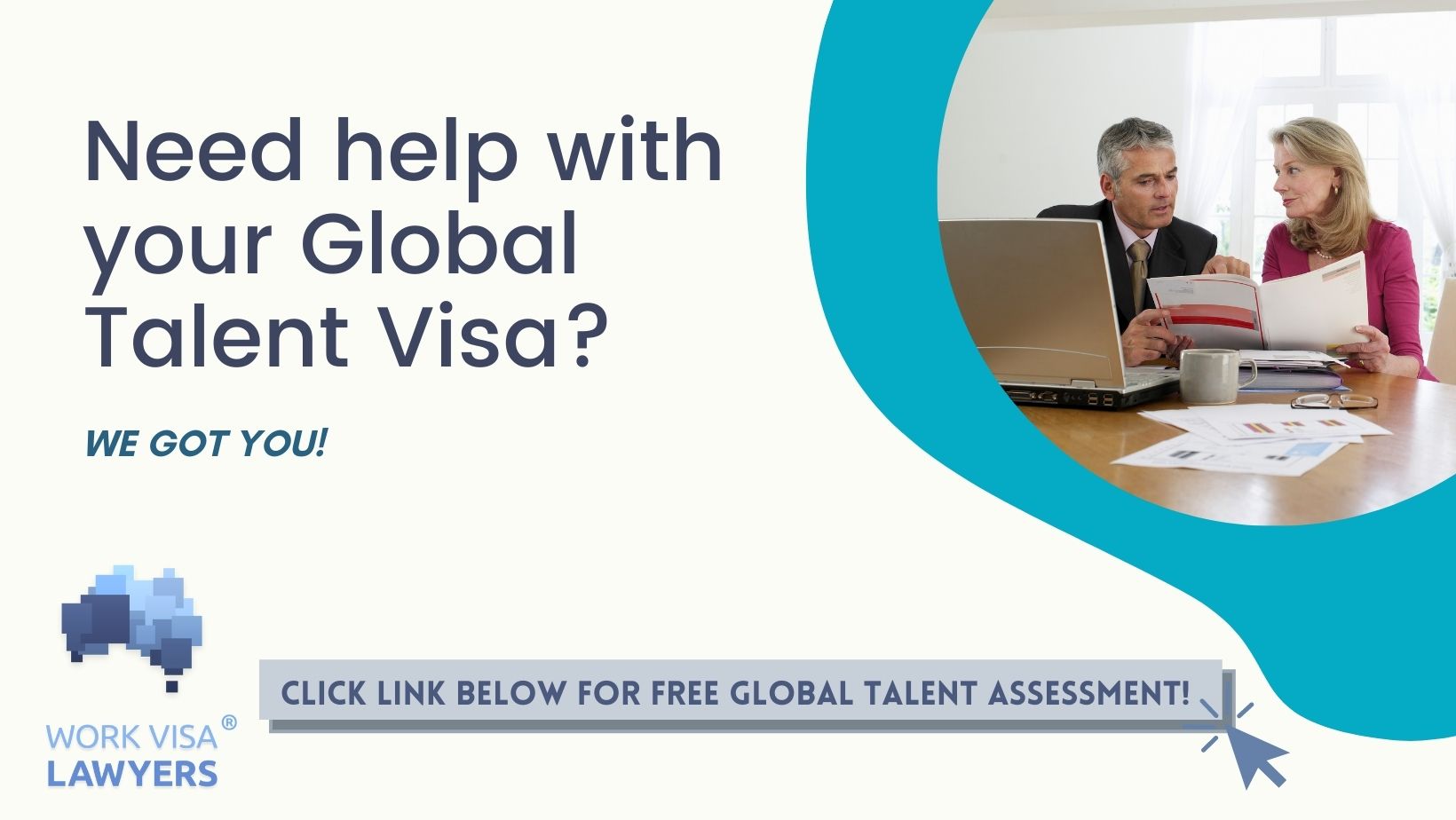This article is updated regularly. Last updated: Wednesday, 22nd January 2025
For quickest response from WVL team, please Leave a comment below or Submit A Free GTV Assessment!
Take Free GTV Assessment Book an Appointment
In this article
- What is the Global Talent Visa?
- Background
- Target sectors for Global Talent Visa
- Requirements of the Global Talent Visa
- Application process for Global Talent Visa
- Related Videos
- Frequently Asked Questions about the GTV
- Common Mistakes
- Fees for a Global Talent Visa
- Processing Times
- Testimonials
- Further Information
- How we can help
- Comments and Questions
If you think you are eligible to apply for a Global Talent Visa Australia, it takes only 5 minutes to complete our free online Global Talent assessment form.
Our lawyers and registered migration agents will assess your eligibility and get back to you.
Do you have a comment or a question for us?
Latest Updates for the Global Talent Visa
The Australian Government announced the closure of the Global Talent Visa in December 2024 and replaced it with the new National Innovation Visa (NIV) as of December 7, 2024.
The NIV is now open for submitting Expressions of Interest (EOI).
Follow this link for more details about the National Innovation Visa.
What is the Global Talent Visa Australia?
The Global Talent Visa (Subclass 858) is a streamlined visa program for highly skilled professionals to move to Australia. The Global Talent visa application process is simpler, faster and more affordable than many other Australian visas, so naturally this makes it very popular. There is no age limit or points testing and it grants immediate Permanent Residency. If you meet the criteria for this visa, please make an appointment to speak with us today - we would love to help you on your visa journey.
There are 2 pathways under the Global Talent Visa Australia:
- the Global Talent visa pathway - an opportunity for highly skilled people in the target sectors; and
- the Distinguished Talent pathway - a pathway for exceptional and outstanding individuals who do not fit into any Global Talent sector. Some examples are as Olympic athletes and famous musicians.
Generally speaking, the Global Talent Visa pathway is easier to attain than the Distinguished Talent. We will explore all angles of your personal situation and advise which visa and which pathway is right for you.
We have assisted with hundreds of Global Talent applications and have an experienced team to help you.
Target sectors for Global Talent Visa
To be eligible for the Global Talent visa, you must be talented in one of the target sectors. The Australian Government's Department of Home Affairs has identified 10 target sectors for the Global Talent visa program:
Resources
- Advanced visualisation technologies, e.g. sensors;
- Artificial intelligence and machine learning technologies;
- Beneficiation technologies (improving the economic value of a resource such as ore.);
- Expertise in energy saving technologies for extracting and processing ores, such as ore body mapping, geophysical tools and drilling, mineral refinement, automated trucks and robotic equipment or grinding and processing technologies; and
- Resource waste management.
Agri-food & AgTech
- Agricultural big data analytics;
- Commercialisation experience within the industry;
- Future proteins for human and animal consumption;
- Food and beverage technology;
- Individual technologies or a combination of technologies related to farm equipment, weather, seed optimisation, fertiliser and crop inputs, and irrigation;
- Precision measurement and/or application of farm inputs such as nitrogen and pesticides, gene editing, nanomaterials and synthetic biology;
- Predictive technologies around planting times, climatic forecasting and crop cycles; and
- Wearable technology, including ear-tag trackers for animal management.
Energy
- Advanced visualisation technology (e.g. sensors);
- Artificial intelligence and machine learning technologies;
- Automation and robotics (e.g. smart sorting technologies for recycling);
- Beneficiation technologies (i.e. improving the economic value of ore);
- Recycling technology (e.g. feedstock recycling or E-waste processing);
- Traceability technologies, e.g. experience with sophisticated material trading systems that make material sources more transparent to consumers; and
- Expertise with the following fields in the sector:
- Hydrogen technology;
- Clean technologies, renewables and hybrids (including solar and wind power);
- Battery/energy storage design (specialised, grid-scale and precursors for batteries);
- Bioenergy and biofuels;
- Micro-grid design; and
- Supporting the transition to net zero carbon emissions.
Health Industries
- Antimicrobial resistance;
- Biochemistry and cell biology;
- Biostatistician;
- Biotechnology;
- Biomedicine and Bioengineering;
- Cell and gene therapies – genomics;
- Clinical trials;
- Digital health;
- Health economists;
- Implantable and wearable devices (e.g. 3D printed custom devices, bionics and prosthetics);
- Infectious disease;
- Medical devices;
- Medical physicist;
- Microbiology and immunology;
- Nanotechnology and genomics;
- Neuroscience and neurology;
- Pharmaceuticals;
- Precision medicine;
- Point of care diagnostics; and
- Regenerative medicine.
Defence, Advanced Manufacturing and Space
Defence
- Augmented and virtual reality;
- Cyber Security;
- Expertise in military equipment acquisition, sustainment and evaluation;
- Robotics and automation; and
- Sensors and analytics.
Advanced manufacturing
- Advanced materials;
- Additive manufacturing (3D printing), materials resilience and repair;
- Artificial intelligence and machine learning;
- Automation & Robotics;
- Bio-manufacturing and biological integration;
- Biotechnologies;
- Digital design and rapid prototyping;
- Digitisation and automation;
- Nano-manufacturing and micro-manufacturing;
- Precision manufacturing; and
- Sustainable manufacturing and life cycle engineering.
Space
- Aviation in space
- Experience that would be of benefit to the National Civil Space Priority Areas:
- Position, navigation and timing (PNT) infrastructure (global navigation satellite systems);
- Earth observation technology and services;
- Communications technologies and services (lasers for data communication, quantum technologies for secure communication, and hybrid radio and optical communications);
- Space situational awareness and debris monitoring (including space traffic management);
- Leapfrog R&D, which includes new rocket technology, high-tech materials, space medicine, synthetic biology, quantum communications, in-orbit servicing and optical wireless communication technologies;
- Robotics and automation on Earth and in space;
- Access to space, which includes international space missions and launch activity;
- Engagement with international space and astronomy regulatory bodies.
Circular Economy
- Artificial Intelligence and digital technologies;
- Bioenergy generation;
- Bio-methane production;
- Commercialisation experience within the industry;
- Development of sustainable production and supply chain practices that reduce atmospheric land and marine pollution;
- Energy infrastructure;
- Recycling and responsible manufacturing to support industries (plastics, paper, glass, tyre components, e-waste and lithium batteries);
- Reducing emissions and increasing efficient use of natural resources (including energy, water and materials);
- Waste treatment (management and reuse) and emissions technology; and
- Waste to Energy (WtE) technology (the ability to generate reliable baseload electricity that is also capable of diverting waste away from landfill and reducing carbon emissions).
DigiTech
- Artificial intelligence (AI) and machine learning;
- Automation;
- Big data;
- Blockchain technology;
- Cloud computing;
- Cyber security detection, prevention and response services;
- Data and eResearch infrastructure;
- Data management and analysis;
- Data science;
- Disruptive technologies;
- Front-end development;
- Internet of Things;
- IT integrated with control systems for plant and machinery;
- Machine learning engineering;
- Network engineer/architect;
- Quantum information and computing;
- Robotics;
- Senior experience in developing and producing digital games and immersive technology;
- Smart cities;
- Smart tech;
- Software and product management/development;
- Start-ups and Entrepreneurs in the industry;
- Systems integration; and
- 3D printing.
Infrastructure and Tourism
Infrastructure
Potential or ability to:
- drive economic development in regional communities;
- develop gateways to support Australia’s international competitiveness;
- improve and expand Australia’s energy infrastructure; and
- improve water security across Australia.
Tourism
Potential or ability to:
- increase the economic benefits to Australia from tourism;
- target high value travellers in the markets and tourism segments that deliver the greatest returns; and
- foster a sustainable and innovative tourism industry.
Financial Services and FinTech
- Automated and predictive financial advice;
- Blockchain technology;
- Commercialisation experience within the industry;
- Digital wallets;
- Financial advice (e.g. automated and digital);
- Financial data analytics, compliance and ‘RegTech’;
- Micro-savings;
- Next generation lending, investment and wealth management;
- Online banking; and
- Platform banking and payments (e.g. contactless).
Education
- Cutting edge innovation within the Education sector
- Research and education infrastructure planning;
- Characterisation (Technologies in advanced microscopy and microanalysis that underpin modern science, medicine, engineering and industrial innovation);
- Digital Data and eResearch Platforms; and
- Platforms for Humanities, Arts and Social Sciences.
If you are highly skilled in one of these areas, or you work in a senior role for a company that provides services in one of these sectors, you may be eligible for the Global Talent visa under the Global Talent pathway.
If you do not work in one of these sectors but you are a highly talented person, you may be eligible under the Distinguished Talent pathway, but the standard you must meet is significantly higher. Please make an appointment to talk to Work Visa Lawyers if you need help understanding which pathway suits you best.
Our successful Global Talent applicant Derek has recently provided us with a video testimonial.
Global Talent Visa Requirement
In addition to being highly skilled or talented in a target sector, you must meet the following requirements:
1. Age requirement for Global Talent visa
There is no age requirement for the Global Talent visa program. However, if you are under 18 or over 55 years of age, you must show that you would provide an exceptional economic benefit to Australia.
2. English requirement for Global Talent Visa
Applicants over 18 years old must show that they have at least functional English.
Each applicant who cannot show this will be required to pay a secondary visa application charge. This charge is currently around AUD $4,890 per applicant.
3. Salary requirement for the Global Talent Visa
The Fair Work High Income Threshold for Global Talent Visa for 2024-25 Financial year is $175,000 AUD. This is indexed annually.
Applicants must show that they are likely to earn or have the "ability to attract" a work high income threshold of at least AUD $175,000 per year in Australia (updated July every year). This can be demonstrated by an existing job or job offer, or advertisements for jobs in Australia in which the applicant has a high chance of succeeding.
Recent PhD graduates may be considered as meeting the salary requirements based on their earning potential, rather than current earnings.
Click here to learn how is ‘high income’ assessed for the Global Talent Visa.
4. Australian nominator requirement for the Global Talent Visa
Applicants must have an Australian person or organisation who will nominate them for the program. The nominator must have a national reputation in the same field as the applicant and attest to the applicant's skills. The nominator must be an Australian Citizen or an Australian organisation.
Click here to learn how to find a nominator.
Nominator of Global Talent Visa program in Australia does not need to:
- provide a job offer or
- sponsor the applicants
- pay anything
Having experienced a variety of applications for the GTV program, we can clearly see that having a suitable nominator can strengthen the chance of getting invitation for Global Talent Visa Program.
A prominent nominator who is Australian citizen can show to the Department of Home Affairs that you earn a good chance of being employed or referred by a prominent person.
We are hearing a lot of comments about people being unsuccessful with ACS. A nomination from the ACS for GTI is getting more difficult since applicants from DigiTech sectors are increasing as the Global Talent Visa Australia program is getting more popular as a fast tracked Permanent Residence visa in Australia for highly skilled workers.
Read our latest article about ACS nomination for GTI Program in Australia here >>
5. Record of exceptional achievement or international recognition in your area of expertise
There are 2 popular area of achievement for whom apply Global Talent Visa Program: Profession and Academia or Research
- If the applicant's area of achievement is in the area of a profession, evidence of exceptional and outstanding professional achievements include:
- National and international industry awards
- High position indicating earned rank within the formal structure of an organization (CEO, Director, Department head and Professor)
- Newspaper and magazin articles attesting to achievements and/or awards
- If the applicant's area of achievement is in the area of academia and research, evidence of exceptional and outstanding achievements include:
- First author of published articles, journals, newspaper or magazine with high regarding rate or citation. The research must be able to commercialize and you are recognized by peers within the industry.
- Honours and accolades
Government Updates
Last February 2023, the Department of Home Affairs provided information to the migration profession in relation to the change in the role of the Departmental officers or representatives. The Global Talent Visa Officers’ role had been changed and they are now referred to as Global Skills Attraction Officers to reflect the new focus, service and functions.
Generally, Global Skills Attraction Officers are tasked to “attract overseas skilled migrants through the permanent Migration Program to help fill critical skill shortages in Australia.” And their role is “largely promotional”.
The Global Talent Taskforce website had also been changed and it is now Global Australia and, while still aiming to attract the best and brightest talents, is now more about attracting investments to Australia. The information about the Global Talent Program has been largely removed from the website.
Government still targeting global talents
Minister O'Neil in her speech to the Australian National Press Club talked about the need for Australia to enter the competition for global talent and the government’s plan to talk/recruit possible migrants with the skills Australia needs. She mentioned how they are bringing into the conversation highly skilled people who can create future jobs and how they can be drivers for Australia's economic growth.
Priorities
This shows the Australian government’s shift in priorities or focus, that is, that they prefer to attract overseas skilled migrants through the General Skilled Migration which includes subclasses 189, 190 and the employer-sponsored visas. In line with this, the government had increased the allocations across these skilled visas. In December 2022 extended 35,000 sc-189 invitations.
Opportunities Skills remains for the Global Talent Visa
The Global Talent Visa Australia though would still be a good visa option for high performing individuals especially for those over 45 years old. It would also be attractive for those whose professions are not listed in the skilled occupations list, for those who do not want to or cannot get a skills assessment for their occupation and for those who do not have at least “competent English skill” required for most skilled visa as the Global Talent Visa only requires functional English.
If you are interested or if you want to check if you meet the criteria for the Global Talent Visa.
In line with Australian Government priorities, the Global Talent Officer (GTO) concierge service and Global Talent Expression of Interest (EOI) prioritisation function is no longer available. Departmental Officials (Global Talent Officers) will no longer consider and endorse requests for priority processing of an EOI from individuals or agents on behalf of individuals for the Global Talent Australia (subclass 858) visa.
- Global Talent visa applicants who have an internationally recognised record of exceptional and outstanding achievement may apply for the visa with or without an EOI. Eligibility is available here
- Applicants who fall within the Minister’s defined sectors (or related sectors) and can demonstrate their potential to earn the equivalent to or higher than the Fair Work High Income Threshold (FWHIT) (currently $175,000), will receive priority processing through the EOI in the Global Talent Program. Further information is available here.

In which order are EOIs considered?
Expressions of Interest are usually assessed in order of receipt, however the following may receive priority assessment:
- Hong Kong nationals and residents
- Candidates of extremely high calibre
- EOIs from candidates clearly outside program parameters may receive an early notification.
New way to check you Global Talent Visa Eligibility - Business Visa Compare
Business Visa Compare is our new developed tool to check your visa eligibility of Business Visa Australia 188 options and Global Talent Visa assessment.
If you are interested in running a business in Australia, or investing to get Australian PR, this is the tool for you.
Within only 5 minutes, you will be able to know whether you are eligible for business visa in Australia or might be good to goowith the Global Talent Visa Australia program.
You also have an option to talk with our Lawyers and Agents to seek advice on the best possible pathway.
Background Of GTI Program
In 2019 the Australian Government introduced the Global Talent Visa program. The visa initially had several streams including the "Global Talent Independent visa" and the "Global Talent Employer Sponsored visa". These streams no longer exist but you may see people still using the term "Global Talent Independent" or "GTI", as the modern version is essentially the same as the GTI visa.
The Distinguished Talent visa was originally a separate visa, Subclass 124. It is now part of the new Global Talent visa scheme, Subclass 858.
In the 2019-20 program year, the allocations were 5,000.
In the 2021-22 program year, the allocations were 15,000.
In the program year 2022-23, the allocations were 8,500.
In the 2023-24 program year, the allocations are 5,000.
In the 2024-25 program year, the allocations are 4,000 including the Global Talent Visa and the National Innovation Visa.
It’s likely that the Department of Home Affairs is becoming increasingly selective as to who it gives invitations, given the limited number of allocations available.
With our experience in the program, and successfully assisted hundreds of clients, we know your chance to get the Global talent visa in Australia.
By conducting our FREE Global Talent Assessment tool here, We will get back to you with a result of your chance and where you should improve to secure the invitation.
What would happen to the Global Talent Visa in the future?
The speech and the report seem to indicate that they are not getting rid of the Global Talent Visa but just reform or restructure it. The review panel suggested considering changes to the Global Talent Visa Australia to improve the clarity in the selection criteria and to consider removing the need for a nomination.
IF the government do get rid of the requirement for nomination, this will be a welcome change for potential Global Talent visa applicants who are leaders in their field but are not able to get a nominator. This requirement has been a common stumbling block for applicants who would otherwise, meet all the other criteria for the visa.
Timings and implementation
From the report and the Minister's speech we think that the Global Talent Visa has a bright future. While the report mentioned the recommended changes, any changes to any visa criteria will require legislative changes and we currently do not know for sure what these changes will be and we do not know when the changes will happen. We do not know yet which of the recommendations mentioned in the report will be adapted by the government.
The pending EOIs and visa applications will have to be assessed with the existing Migration Regulations and laws until the new regulations are issued and be in effect.
For those who already lodged their EOI or their visa application, the speech and the report do not have an effect on the timelines or processing times for those lodged EOIs and visa applications. The timelines which would be what the Department releases regularly. As to the quota or migration planning levels, the Government will be releasing these in the coming weeks when it releases the Federal Budget on the 9 May 2023.
Application process for Global Talent Visa
To apply under the Global Talent Visa Program, applicants must go through two stages:
- Expression of Interest
- Visa application
An expression of interest must be submitted online via the Department of Home Affairs website.
If you are successful with this first stage, you will be provided with a unique Global Talent identifier and invited to submit a visa application.
Once this happens, you can then proceed to lodge your visa application. The Department of Home Affairs has recently set the Immi Account system up so that these applications can now be lodged via your Immi Account if you have one.
Frequently Asked Questions about the Global Talent Visa
What is the Global Talent Visa?
The Global Talent Visa Program, or the Global Talent Independent Visa GTI), is a fast-tracked and streamlined permanent visa pathway designed to attract highly skilled and highly talented individuals to work and live in Australia.
What occupation should I have to be eligible for the GTI visa?
To be eligible for the Global Talent visa you should be highly skilled and working within any of the following target sectors:
- Resources
- Agri-food and AgTech
- Energy
- Health Industries
- Defence, Advanced Manufacturing and Space
- Circular Economy
- DigiTech
- Infrastructure and Tourism
- Financial Services and FinTech; and
- Education
What are my nominator’s obligations?
Nominators are required to attest to the applicant’s national reputation, prominence and achievements.
They are not sponsoring the applicant and are not obligated to provide employment to the applicant.
Your nominator should attest:
- to your record of exceptional and outstanding achievement
- to your prominence in your area;
- that you would be an asset to the Australian community; and
- that you would have no difficulty in obtaining employment, or in becoming established independently, in Australia in your area.
They are also required to produce a completed approved Form 1000.
What if I cannot find an Australian nominator?
Having a nominator is a legislative requirement to be granted a GTI visa. If you do not have one, you will not meet the criteria and consequently will not be granted the GTI visa.
If you are an engineer and cannot find a suitable nominator, you can apply to Engineers Australia for a nomination. You can read more about this here.
If you are working within the following sectors: Cyber Security, Quantum Information/Advanced Digital/Data Science/ICT, FinTech, MedTech and AgTech, the Australian Computer Society (ACS) may be able to provide you with a nomination. You can go to the ACS website for the application process.
I have a Bachelors Degree, Honours Degree, or a Masters Degree. Am I eligible to apply for a GTI visa?
Yes, you may still be eligible but you can not purely rely on these degrees to get an invitation to apply for the GTI visa. You will need to show that, in addition to your degree, you:
- have an internationally recognised record of exceptional and outstanding achievement in one of the target sectors;
- are prominent in the area;
- would be an asset to the Australian community;
- would have no difficulty in obtaining employment, or in becoming established independently, in Australia; and
- have an Australian nominator (who can be an individual or an organisation) who has a national reputation in your field that can attest to the above.
I don’t have a university degree. Can I still Apply?
Your talent doesn’t necessarily have to be academic, you might also have a record of exceptional performance in a profession. We have seen candidates granted Global Talent visas on the basis of their successful career history in the right sector.
I am highly skilled, but my field is not one of the sectors listed. Is there a way I can apply for a Global Talent Visa?
If your sector is not included in the list as a target sector for the Global Talent Visa but you are an accomplished, highly-skilled talent or professional you may still be able to apply for a GTI under the Distinguished Talent pathway. You will need to show you are exceptionally talented to qualify for this visa.
I have a serious health condition, will this affect my GTI visa application?
Applicants for the GTI visa are required to meet the Australian health requirement. If you have a serious health condition you must apply to the Department of Home Affairs for a PIC health waiver. You will need to provide submissions with complete supporting documentation with your visa application.
You can read more about health waivers here.
We have experience assisting with PIC 4007 Health Waiver Requests. And you can find some of our happy clients’ positive feedbacks for Health waiver and GTI applications on our website.
I have just submitted my Expression of Interest (EOI), how long should I wait before I expect to hear back from the Department of Home Affairs?
There is no simple answer to this question. As with the other applications, processing times vary. It can be anywhere between one month to four months.
If you are from Hong Kong or on a very high income, you might be eligible for fast-tracked, priority processing. Read our article on Global Talent Visa processing times here.
I have just received an invitation to apply for a GTI visa, what is the processing time? When can I expect a decision?
As above, it depends. If you submitted a complete application with all questions answered and all documents attached, you might get a decision quicker than if the Department has to contact you for more information. That being said, 90% of invited applicants will have their visa processed in 3 months, and a lucky 75% of applicants get processed on less than 73 days. Given many other visas take years to be processed, even the slowest Global Talent visa will still be faster than the alternative.
I think I’m eligible for the Global Talent visa, but I don’t know where to start. What should I do?
Make an appointment to speak with one of our friendly immigration lawyers or registered migration agents at Work Visa Lawyers, we’ll be happy to explore and explain all your visa options.
If you just can’t wait, fill out our Free online Global Talent Quiz and one of our team will get back to you with an initial assessment.
I am a Ph.D. Graduate, am I likely to be invited?
There are a lot of Ph.D. graduates getting the invitation, meaning the Department of Home Affairs has a strong preference for Ph.D. graduates for Global Talent Visa who:
- Are undertaking research that is highly novel and can be commercialized
- Have demonstrated employability (securing a postdoctoral position or job offer in the industry)
For Ph.D. Graduate, your research quality and citation rate of all published publications will determine your competitiveness.
Employability will show that businesses can commercialize your research in your area of expertise or even further funding to support the research.
Proving to be an asset to Australia is the key to success in the Global Talent Visa program.
How to know if I'm exceptionally talented or distinguished talent?
This is entirely subjective to say anything about exceptional talent apart from those world stars in sports or arts. It does not need to be having a publication or conference speaking to be a talent. You can even use your career history, like researching a new way for something, doing campaigns that impact an international matter like Covid-19.
Consider whether you have had significant academic or professional achievements that are not in theordinary course or something that no one else can achieve except you.
Proof of those achievements is essential.
Completing our FREE GTV Assessment and telling us all the achievements you can think of will help you measure your chance of getting an invitation.
How do I find a nominator?
The nominator is one of the 4 core factors to determine whether you have a good chance with the Global Talent Visa program or not. No specific employer nominates a group of talents; it could be your employer, an industry peer or senior colleague of you, an academic colleague, or even an industry body who is an Australian Permanent resident or Citizen.
We have found a few popular options to consider: Australian institutes like universities where research is mostly done, or the Australian Computer Society (ACS) who, typically nominate applicants working in DigiTech, FinTech, and AgTech.
Big organizations like Rio Tinto or Commonwealth Bank Australia love nominating their employees for a straight permanent residency at a lower cost than the Employer Sponsorship pathway.
Read our blogs about nominatorsDo you help find a Global Talent Visa program nominator?
We provide recommendations based on an individual’s profile. We have made a lot of GTV with various sectors to know which nominator could be the best one that suits you.
However, we do not source the nomination for you and will not get involved in the process of finding nominators for clients.
I do not have any publications or Ph.D. certificates; can I still apply for a Global Talent Visa?
Everyone must have a record of exceptional achievement. However, it is not limited to academic publications or conferences you attended; you can use your exceptional achievement in your profession, such as DigiTech. They do not have many publications or Ph.D., but we have seen many of them get the invitation just using their successful career history.
Will the Department of Home Affairs contact my nominator? And What should they do if that happens?
Yes, probably. We don’t say 100%, but you should be prepared for that by notifying your nominator after submitting EOI. The purpose of contacting the nominator is to undertake some due diligence and verify that they know the candidate and have indeed signed form 1000.
Some key points worth mentioning here, the conversation will also be about how the nominator sees the candidate about critical issues written in form 1000 as in an international record of achievement, how they are an asset to Australia, or the ability to self-establish in the nominated area of expertise.
There are some dialogues taking up to 45 minutes. However, the average amount of time is 15-20 minutes.
Overall, this is good that the government wants to ensure the integrity of the Global Talent Visa program.
Common Mistakes
Use of Technical Language
The person assessing your application is not going to be trained in your area of expertise. They are a government employee who most likely has an undergraduate arts degree. They are probably not going to understand the technical terminology of your field. It is the role of your nominator to verify that you are an expert in your field, not the person reviewing your application, so keep the wording of your application as simple as possible. You will need to explain what you do in layman’s terms, for example: if you are a paleobotanist you might say that you study plant matter in fossils to assess the likelihood of fossil fuels existing in nearby rock structures.
You can include some information about why your particular area of work is special, say in the paleobotanist example, you might say you are investigating a unique plant that could lead to renewable fossil fuels, but keep it simple.
If the Department cannot understand your application, it is going to take longer to process and may even result in a refusal.
Focusing on the Wrong Aspects of Your Application
We have seen clients who were very eager to mention names of people they knew or had worked with, but they did not have an employment or contractual relationship with. This is not the sort of information the Department finds useful in assessing an application.
Similarly, talking too much about your area of expertise can be a deterrent. It is important to provide enough information, but not too much information.
Rushing your Expression of Interest (EOI)
We know the Global Talent Visa is a very exciting prospect, but sometimes we see people who have written their EOI quickly, been very excited, and submitted it without giving themselves time to revise. The EOI is a very important document of the Global Talent Visa so it is worth taking the time to re-read it and make sure everything is clear and correct.
Not Having a Nominator
A lot of EOIs do not have a Form 1000 Nomination for Global Talent attached, and this is a big mistake. Quite simply, if you submit an EOI without nominator, your application is almost guaranteed to be rejected.
Not Mentioning Your Partner’s Skills
Is your spouse or partner also highly skilled? This could help! The Department of Home Affairs has a lot of discretion in deciding who they will grant the GTV to, so it helps to tell them every little thing that could work in your favour. If they can see that granting you a visa will benefit Australia twofold, this may improve your changes of being selected.
Not Seeking Professional Advice
While not everyone wants to engage a migration agent or lawyer to write their visa application, you really are doing yourself a disservice if you don’t obtain some professional advice. At Work Visa Lawyers we help clients apply successfully for Global Talent Visas every day and we know what makes a good application great. Make an appointment to talk to one of our team today so we can maximise your chances of receiving an invitation for the Global Talent Visa.
What are the fees for a Global Talent Visa?
Government Fees
There are no government fees to submit an Expression of Interest.
The government fees to submit a visa application are:
| Base Application Charge: | AUD4,840 |
| Additional Applicant Charge: | AUD2,425 |
| Additional Applicant (under 18) Charge: | AUD1,210 |
| Additional Charge for not having Functional English: | AUD4,890 |
Videos relating to Global Talent Visa
Do you think you could meet the criteria of Global Talent Visa Australia subclass 858? If you are still not sure, we are here to help. Firstly, watch our videos on YouTube or read our blogs about the Global Talent Visa program with all the experiences and tips from our Agents and Lawyers.
You can always go to our YouTube channel: Australian Immigration - Work Visa Lawyers
Global Talent Visa Video Playlist on YouTube
Professional Fees
If you engage a lawyer or migration agent to help with your application, you will need to pay their professional fees. Work Visa Lawyers offers an initial 45-minute appointment for AUD330. During the appointment, we will assess your personal situation and provide a quote on fees for assistance if you choose to proceed. The AUD330 from your first appointment can be deducted from any fees you incur for professional services provided by Work Visa Lawyers after you have signed up.
What are the processing times for the Global Talent Visa Australia?
Expression of Interest Processing Times
EOI processing times vary depending on whether your EOI has been given priority and "fast-tracked", or is being considered based on the date it was submitted (queued).
If your EOI is given priority, it can be processed as quickly as 2 weeks to 3 months.
If your EOI is queued, it may take 8-12 months.
Visa Application Processing Times
Processing times for the Global Talent visa application itself also tend to vary a lot between individuals. We have seen visas granted in the Global Talent stream as quickly as 13 days. Some applicants may need to wait as long as 4 months, but this is still a very fast Australian visa.
Testimonials - Global Talent Visa Australia Successful Cases
Our client is featured on the Global Australia website - official site for Global Talent Visa
Congratulations Sanchita Mohanty for being feautured on Global Australia website. Sanchita is our client who is working in Infrastructure, making the most of digital tools enabled Sanchinta Mohanty to design and implement a global transformation program for an international logistics company during the COVID-19 pandemic.
“Australia has significant opportunities of growth especially in the field I operate in, global supply chain, and what better time to be here.” Said by Sanchita Mohanty
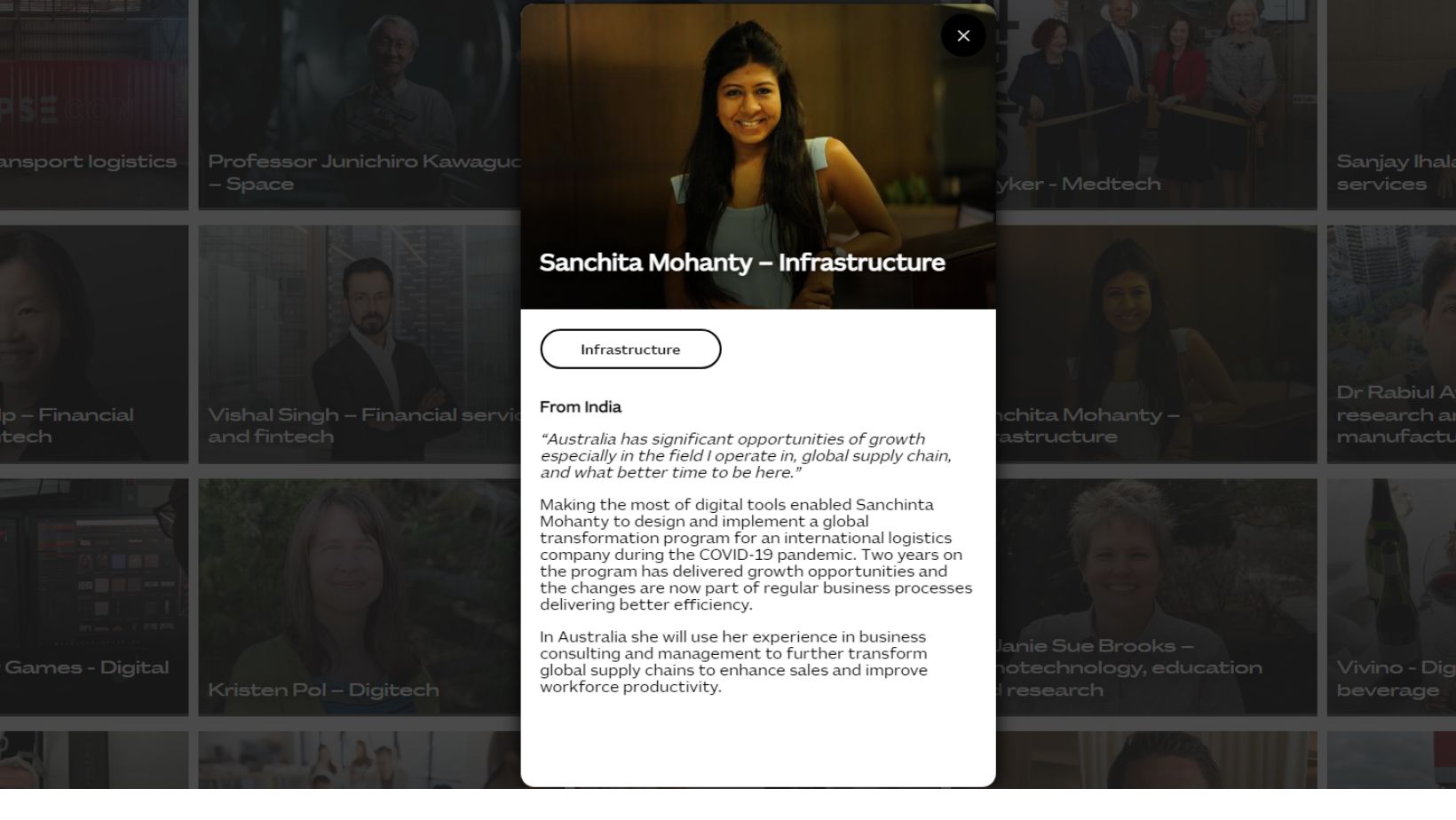
Thank you Sanchita for being very supportive to us and let us do our best to bring you success on Global talent visa.
We wish you best of luck on your future journey!
11 Global Talent Visa Invitations and Visa Grants From February 2022 Until April 2022
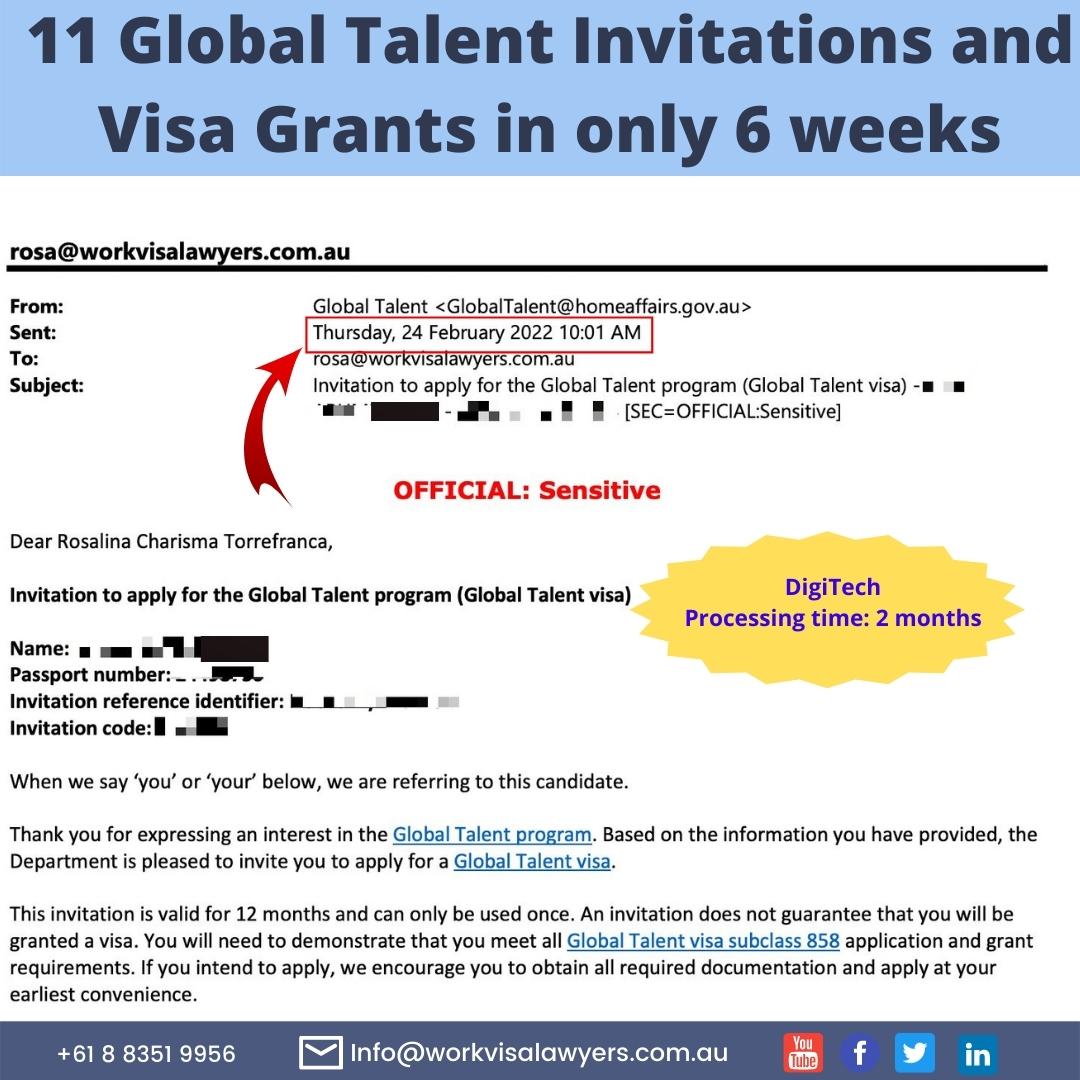
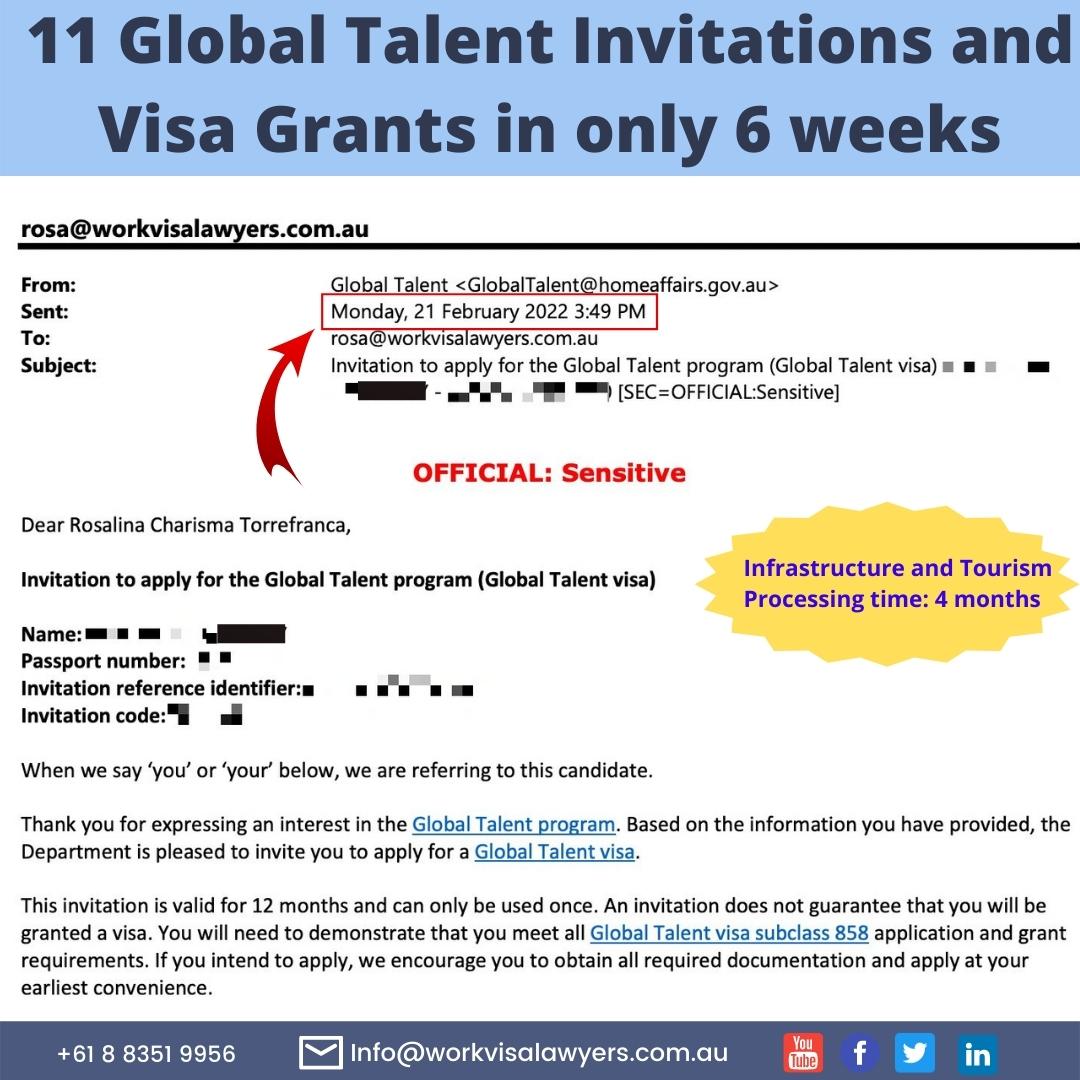
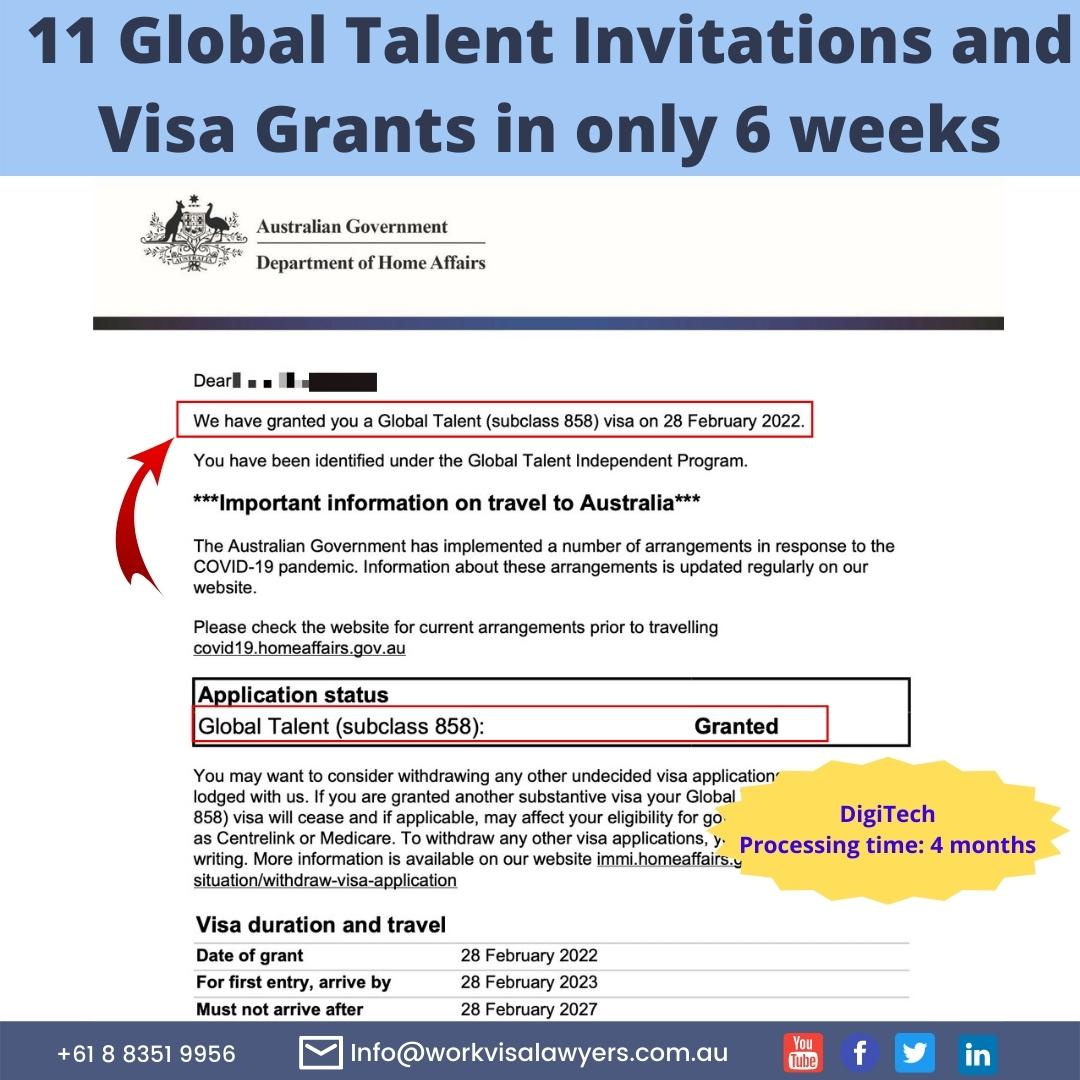
Read the blog about the Global Talent Visa successful cases here >>
Rob's Testimonial
Let's meet Rob, a successful Global Talent Visa candidate! Rob is working in MedTech industry. Find out how he secured the Global Talent Visa invitation with Work Visa Lawyers.
What I can say is that if you're looking for the right advice from the right people and the support to get the right information and to maximise your opportunity to get your visa, I recommend that you call Work Visa Lawyers and get your application in.
Further Information about the Global Talent Visa Australia
You can find further information about the Global Talent visa at the following links:
Articles about the Global Talent visa
Videos about the Global Talent visa
Latest blogs about Global Talent Visa Australia:
1) ACS nomination for Global Talent Visa in 2022
2) 4 Things to be done before lodging Global Talent Visa EOI
3) Global Talent Visa vs General Skilled Migration program (Visa 491, Visa 190 and Visa 189)
4) Top 5 ways to get Australian Permanent Residency (PR) in 2022
5) What you need to know about Global Talent Visa Australia 2022?
6) Top 5 most popular sectors for the Global Talent Visa Program
7) Top 10 Global Talent Visa nominators announced by DHA
How can Work Visa Lawyers help?
Work Visa Lawyers is highly experienced in all parts of the Global Talent visa application process and proud to be one of the best Global Talent Visa Agency in Australia. We are able to assist with all aspects of the application, and can also provide advice in relation to:
- your eligibility for a Global Talent Visa
- documents to demonstrate your skills and ability to attract salary
- finding an Australian nominator
Work Visa Lawyers will provide an eligibility assessment before advising you to proceed with a visa application.
Our team of experienced Immigration Lawyers and Migration Agents look forward to assisting you with your Australian visa or appeal.
Based in Adelaide South Australia, we provide Australian Immigration advice to people and businesses from all over the world.
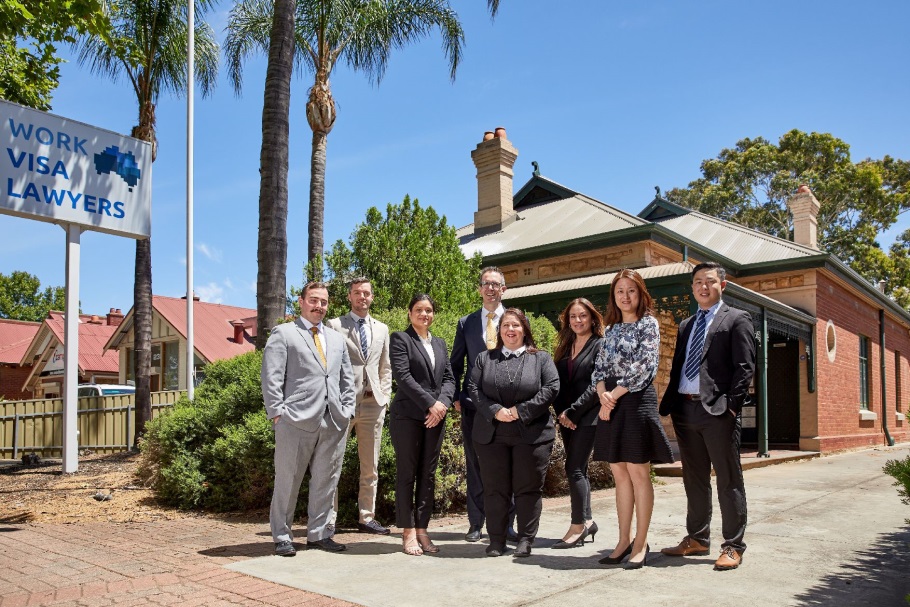
Book an appointment with one of our experienced Immigration Lawyers and Registered Migration Agents here.
Contact us on (08) 8351 9956 or +61 8 8351 9956 or This email address is being protected from spambots. You need JavaScript enabled to view it.
Free online Global Talent assessment
If you think you are eligible to apply for a Global Talent Visa, it only takes 5 minutes to complete our free online Global Talent assessment form and our lawyers and registered migration agents will assess your eligibility and get back to you.
Join the discussion — ask us a question or share your experience
Use the form below to post a message and one of our experts will get back to you shortly.
Related Information
- Core Skills Occupation List (C... On December 3, 2024, the Australian Government announced the release of the new Core Skills Occupation List (CSOL). Developed by Jobs and Skills Australia (JSA...
- Global Talent (subclass 858) i... Visa applied for: Distinguished Visa (subclass 858) through the Global Talent Independent Program Date of EOI: 19 May 2020 Date of visa application: 29 Ju...
- National Innovation Visa (NIV)... This article is updated regularly. Last updated: Wednesday, 22nd of January 2025 Complete the free NIV assessment The New National Innovatio...
- 482 Visa Skills in Demand (SID... This article is updated regularly. Last updated: Wednesday 19th of February 2025 What is the new Skills in Demand Visa? The Migration Strategy, released...
- Subclass 858 Global Talent: Di... Visa type: Subclass 858 Global Talent Visa EOI lodgement: 2 March 2021 EOI Invitation: 10 March 2021 Date of visa application: 6 April 2021 Date of visa grant:...
- 858 Global Talent Independent ... I recently was granted the 858 Global Talent Independent Visa and Work Visa Lawyers, which were crucial to guide me throughout this intricate application. A b...


